Last week, we (Gretchen and Elizabeth) introduced you to Supergirl and hopefully you’re at least intrigued by your first date and ready for more. Supergirl really comes into its own in these episodes and the tension continues to build until the end of the season, so even if you weren’t convinced by last week, we hope that this week will give you (yet another) reason to give this show a second chance.
Episode 6 alone is worth a watch just to see a black man and a woman have a discussion about not being able to show anger in public because of their position as minorities. And Episode 7 has James Olsen in a tank top (*fans selves*) and a huge reveal about Hank Henshaw; Episodes 8 brings Astra and Non back into focus and ends in a cliffhanger, so you have to watch Episode 9, too. And then Episode 10 gives us so many feels…just watch them all. You’ll thank us.
Quick Recap of Episodes 6-10: Flying High
In this part of Kara’s arc, she has grown comfortable enough with her role as Supergirl that she’s taking on bigger baddies without stumbling. When she is knocked down, she gets back up and tries again. She’s moved from learning how to be a hero to what makes a hero: controlling her anger, never giving up even if she feels helpless, overcoming pain and her past, choosing to balance normal and superhero life, and giving back to her friends when they need her.
She’s also in the period of temptation. Will she choose anger and distrust over love? Will she give into the feeling of weakness instead of finding new ways to be heroic? She’s given two opportunities to make being a superhero her full time job—one when Cat tells her to quit CatCo if she’s really Supergirl and once when Hank offers her a full-time job at the DEO. Instead, she chooses to balance her superheroism with a ‘normal’ life. She resists every temptation to extremes. So far.
Relationship dynamics deepen and are complicated by the story. Alex gains a mentor in J’onn Jonzz. Kara gains a mentor in Cat. Cat, on the other hand, is softening and opening up because of Kara/Supergirl. J’onn does the same with Alex. Romantic interests come to the fore (Winn and Kara, Lucy and James, possibly Lord is interested in Alex), but are never fixated on. Each episode brings us new elements of both resolution and tension without lingering in one state for too long.
Episode 6: Red Faced
The one in which minority characters talk about not being able to show their anger in public because of double standards. Kara stops two road raging dickheads from hitting a street full of children, but one of them tries to hit her and she hurts his hand, so she gets a talking to about managing her anger (and image) in public. Cat Grant has to cope with her emotionally abusive, passive aggressive mother (Katherine Grant) insulting her in the most condescending, shitty way possible. General Lane (Lucy Lane’s dad) shows up with the android weapon Red Tornado that he wants to test against Supergirl, who agrees so she can prove to Lucy and General Lane the government that she’s trustworthy.
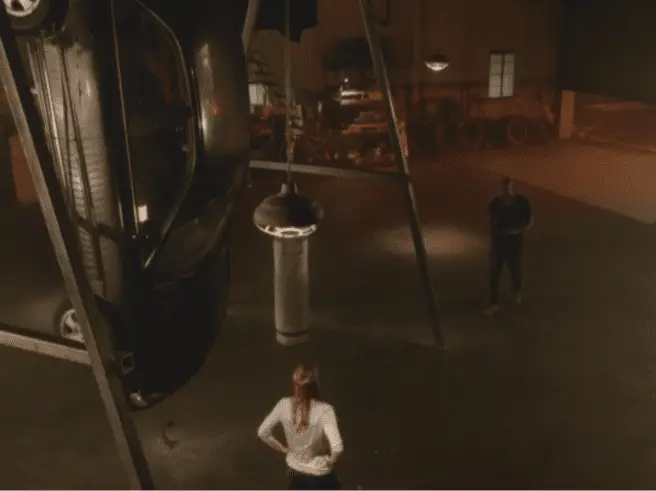
James invites Lucy over to game night with Kara and Winn and a whole lot of Awkward ensues. Kara beats Red Tornado, but punches the android when it’s down (because anger) and the android flies off. General Lane blames Supergirl for the rogue android and scraps the project, pissing off the creator who uses the rogue android to try and get revenge against Lane. Cat takes her mother’s abuse out on Kara; Kara snaps. Instead of firing her, Cat takes Kara out for drinks where we meet Mentor Cat, who talks Kara through why women can’t show anger in public. General Lane, Lucy, and James go out for dinner where a thinly veiled racist conversation ensues when General Lane tells James he’s ‘not good enough for Lucy.’ Kara and James let off steam by punching things. Kara defeats Red Tornado; Lucy decides to stay in National City with James; Cat stands up to her mom; Winn discovers that Hank Henshaw and Mr. Dr. Danvers went to South America to track down an alien, but only Hank returned. Finally, Kara cuts herself on glass and bleeds. What????
Best Quote: “This is the important bit, you weren’t really mad at me… You were really mad at something else. You need to find the anger behind the anger. And you need to figure out what is really making you mad.” —Cat Grant
Episode 7: Human For A Day
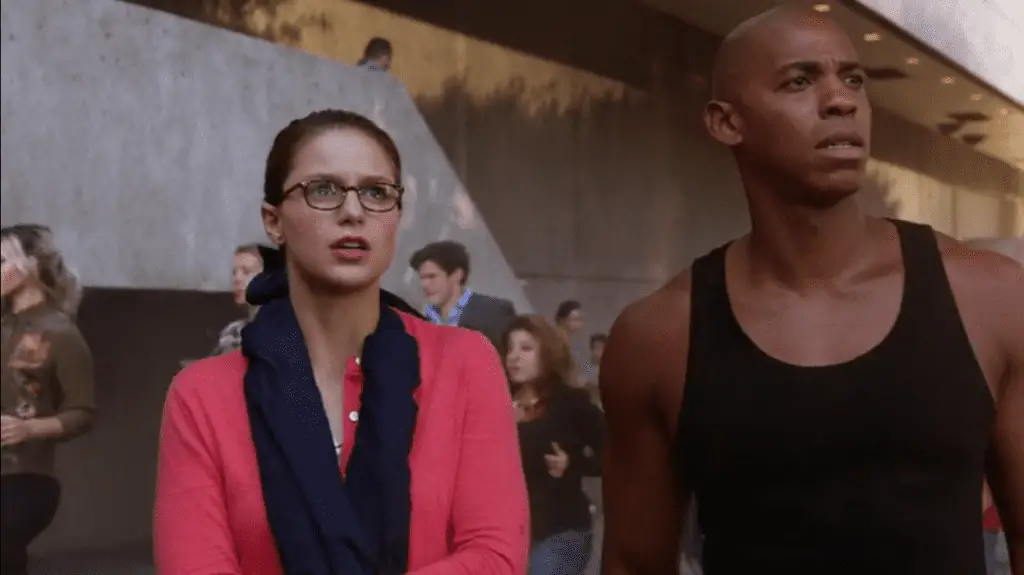
The one where the humans get to save the day. The fight with Red Tornado has drained Kara of her powers and she has to recharge like a battery for a few days. Alex is tasked with cleaning out the holding tank of an alien named Jemm with mind control powers. An earthquake hits National City, releasing Jemm into the DEO to wreak havoc; Alex’s distrust of Hank bodes ill for their teamwork in taking Jemm down. The quake also results in Kara breaking her arm when James saves her from trying to stop a taxi that would have killed the weakened Supergirl; he uses his shirt for a sling. Out on the streets, Lord is fear-mongering because of Supergirl’s absence and Cat decides to give the city a dose of optimism and hope for a change (It’s an excellent speech, really. You can watch it here in full).
Kara enlists James’ help to confront Lord, who is using relief tents to market himself as the real savior of National City now that Supergirl has lost her powers (which he knows about). Kara can’t save a man from dying and feels helpless living as a human. Alex goes in search of Hank after he and his team of agents are attacked by Jemm. Kara stops a robbery using only the power of de-escalation (the scene is interspersed with Cat’s speech above, go watch it), proving that she doesn’t need powers to be a hero. Winn tells her she needs a jolt of Kryptonian adrenaline to regain her powers, which she gets saving James from falling down an elevator shaft. Supergirl tells Cat that she inspired her with the speech she made to the city, that she’s the real hero of the day. Cat is pleased. After getting Jemm, Alex confronts Hank with what she knows from Winn. Hank reveals who he really is:
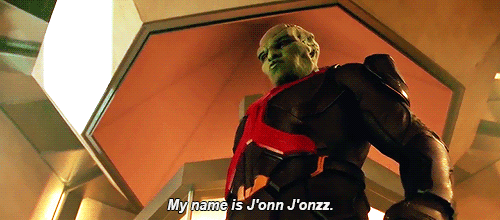
Best Quote: “No hero can save everyone, not even Superman. But a real hero never stops trying.” —James Olsen
Episode 8: Hostile Takeover

The one where Cat and Kara are hijacked by dangerous things from their past. Astra tries to recruit Supergirl because they’re family. Supergirl rejects the ‘kind’ offer, they fight. At Catco, Cat’s emails have been hacked and details about her life leaked to the press. Cat recruits Winn, James, and Kara to read her emails to see if there is anything else damaging. Astra and her husband/junior officer Non confer about their evil plans. He questions her loyalty and offers to kill Kara for her if she can’t be recruited. Alex tells Kara she can’t hold back against Astra. Both Kara and Astra insist that they can handle each other. Kara overhears a board member whispering about ‘taking Cat down’. After Lucy tells them they need proof of his involvement, the Scooby Gang Kara, Winn, and James set about hacking the board member’s computer for proof (which was not Lucy’s legal advice).
Supergirl defeats Astra in a fight and drags her back to the DEO. Commence Astra’s mind games on Kara trying to convince her that her mom was the real enemy and Astra was just trying to help Krypton. Kara and co learn about Adam Foster, who Cat ends up admitting is a son she put up for adoption and prepares to step down from Catco rather than see Adam brought down and ruined for her mistakes. Kara and Winn give Cat the ammo she needs to take out the board member in the nick of time. Cat confronts Kara about her being Supergirl. Awkward stumblings from Kara ensue. The DEO realizes that Astra is a diversion. On the other side of town Non and a band of Kryptonians from Fort Rozz are attacking Lord Technologies. A battle royale commences and the episode ends in a cliffhanger.
Best Quote: “You have no idea what that moment is like, when you have to say to yourself, ‘Maybe my child would be better off without me.’…Not being there for Adam is my greatest regret. And now, for all we know, somebody is about to release it to the world.”—Cat Grant
Episode 9: Blood Bonds
Non bests Kara and takes Hank hostage. Lord gets lordly and demands the DEO and Supergirl leave his private property because he Distrusts the Government. Alex is named acting director of the DEO. Astra tries again to win Kara to her side (again) by claiming they are bonded by blood. We learn Alura put Astra and Non away for eco-terrorism because people died when they were trying to help save Krypton. Kara tries (unsuccessfully and adorably) to convince Cat she’s not Supergirl. Non offers to trade Astra for Hank. General Asshole Lane takes over the DEO from Alex. James tries to investigate Lord and instead gets the most condescending explanation of demonization in the press from Mr. Whitey McRichPrivilegedDouchebag himself. Non tries to interrogate Hank, but the weird mind-reading alien with him can’t see into Hank’s head. General Lane is more successful with Astra when he injects her with Kryptonite against Alex and Kara’s wishes.
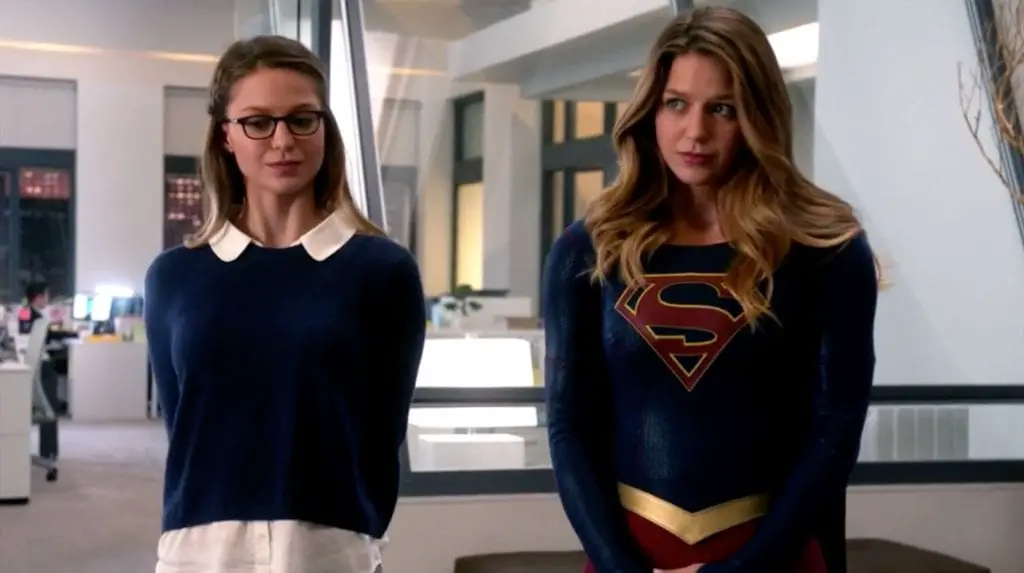
Cat can’t stand Supergirl potentially ‘wasting time’ behind a desk instead of helping people, so she gives Kara an ultimatum: either prove she is not Supergirl or Kara loses her job. James and Winn break into Lord Technologies, but James is found out before he can break into the super secret lab with the biometric lock. Astra’s torture results in false information that gets DEO agents killed. Lord beats up James before letting him go with a warning. Kara lets Astra tell her the truth about her mom, who, it turns out, had faith that Astra was right about Krypton’s demise. Kara defies General Lane and trades Hank for Astra. Astra talks Non out of not killing Kara because of the good faith trade. Kara overhears Alex say something suspicious to Hank and learns he is J’onn Jonzz. Since he is a shapeshifter, J’onn pretends to be Supergirl to help Kara keep her job with Cat. Kara’s new mission in life is now to take down Lord.
Best Quote: “But if we have any hope for the future, we can’t let our fear control us. We have to be better.”—Kara Danvers
Episode 10: Childish Things
The one about mental illness and fucked up parent-child dynamics. Hank/J’onn (J’onn from here on out), Alex, and Kara discuss breaking into the super secret lab in Lord Technologies. Cat offers Lucy a job as her special counsel, which makes Kara and James feel a bit weird. Toyman escapes from a maximum security prison using a killer yo-yo (no joke). This freaks Winn out because it turns out, he is Winslow Schott Jr, son of Winslow Schott Sr. aka Toyman. Winn explains to Kara that his dad once killed a lot of people because his boss had stolen his toy ideas. He agrees to help the FBI take his father into custody. Alex talks J’onn into sneaking into Lord’s lab while she pretends to go on a date with Lord to keep him away. Lucy and James have a charged conversation about her taking the job at Catco.
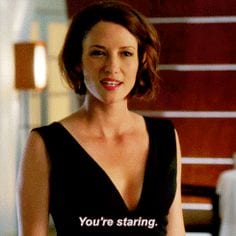
Winn meets his dad at an arcade as part of the FBI sting, but it’s a trap! Kara saves the day, but only after Winn has to listen to his father talk about how alike they are and that Winn is his greatest creation (gross). Kara prevents Cat from manhandling Winn into an interview. J’onn does a hilarious impersonation of Lord, breaks into the lab, and finds a girl with freaky black eyes lying on a gurney. Kara tries to talk Toyman down (as she does), but he gets away. Winn breaks down about turning into his dad. Kara comforts him by saying his choice to do good instead of be angry when his father killed people proves that he is a better person. Winn tries to kiss her. Embarrassed by her rejection, Winn leaves and is kidnapped by his father. Winslow Sr. recruits Winn to shoot the man who wronged him or he will set off bombs at the local toy convention; he wants them to either die together or go to prison together (again, gross). Winn goes to the Toy Con, but refuses to turn into his father and instead helps Supergirl save the day.
Kara wants to forget their kiss, but Winn says he is done hiding/stuffing his feelings. He apologizes for kissing her, but admits he loves her. He has learned from his father that it is better to be honest rather than hide. She doesn’t return his feelings and they leave off not sure what happens next. Kara and Alex have Pizza Night together as Lord spies on them from the camera he hid in Alex’s purse.
Best Quote: “His genes are like ticking time bombs, just waiting to go off inside of me, turn me into him… And now every time I start to get angry, I think, ‘Could this be it? Could this be the day that I lose everything?’”—Winn Schott, Jr.
Characters
Four new characters for you this week, and they’re good ones. Then again, they all are, even the villains and antagonists are excellent. Horrible people maybe, but great characters.
The Fantastic Four: Alex Danvers
 Alex Danvers is an expert in everything a secret agent should be and then some: she personally trains Kara in hand-to-hand combat techniques, demonstrates strong leadership abilities, can handle a variety of weapons both human and extraterrestrial, and rounds it out with a master’s in biological engineering (making her an expert in alien physiology). As Alex herself says, Kara isn’t the only badass in the family. She is one of the strongest human characters on the show, both physically and mentally, and shares Kara’s passion for redemption and second chances despite being much more realistically cynical about the world. Alex herself received a humongous second chance at life via her employment at the DEO, and she makes a great deal of effort to pay that opportunity forward however she can.
Alex Danvers is an expert in everything a secret agent should be and then some: she personally trains Kara in hand-to-hand combat techniques, demonstrates strong leadership abilities, can handle a variety of weapons both human and extraterrestrial, and rounds it out with a master’s in biological engineering (making her an expert in alien physiology). As Alex herself says, Kara isn’t the only badass in the family. She is one of the strongest human characters on the show, both physically and mentally, and shares Kara’s passion for redemption and second chances despite being much more realistically cynical about the world. Alex herself received a humongous second chance at life via her employment at the DEO, and she makes a great deal of effort to pay that opportunity forward however she can.
Of course, Alex is not without her flaws; she can be rigid and stubborn, and struggles with feelings of jealousy over being the ‘normal’ one compared to Kara. The pressure her parents put on her to protect and take responsibility for Kara has left her with a chip on her shoulder the size of Alaska.
However, she makes an effort to work through her negative emotions as they occur, not just when she is forced to, readily admitting her jealousy to Kara each time it comes up. Her first and foremost priority is to be there for her little sister, in whatever way Kara needs her, whether that be emotional support, fashion advice, or donuts. Or ice cream, or potstickers. (Kara likes food okay?) She’s also one of the most relatable characters on the show for both of us. Drinking her way through the Danvers Thanksgiving of Extreme Awkwardness? We feel you, Alex, we feel you in our souls.

The strength of the Danvers sister’s love for one another conquers many obstacles throughout the season that would otherwise be humongous stumbling blocks for other siblings. They are at once a testament to the powerful bonds of found family and how healthy an adoptive/foster family can be. The level of honesty that Alex has about her feelings is refreshing, and conflicts that would typically last entire seasons on other shows are neatly resolved in one or two episodes due to Alex’s determination to always talk things through.
When Alex kills Astra, for example, the audience expects that the backlash will destroy the seemingly all-too-perfect bond between her and Kara. The writers flirt with audience expectation in this regard, building up Kara’s feelings of betrayal when she believes it is J’onn who killed Astra. When Alex finally caves and admits the truth, Kara starts to walk away, but finally turns and embraces her sister in forgiveness. Likewise, when under the influence of red kryptonite, Kara turns Alex’s honesty about her jealousy against her. But even that is not enough to break their sisterly love.
It’s important to point out that all the beats feel earned in large part because the situations are treated with the appropriate level of seriousness. Both parties express remorse and take responsibility for themselves. Alex’s commitment to talking things out means that wounds do not fester for the sake of Dramatic Tension™.
The Supporting Heroes: James Olsen
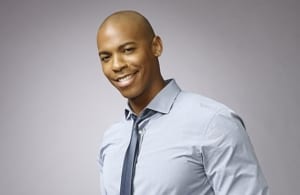 Yes, it’s James now: ‘Jimmy’ is reserved for Superman and his mom. Ready to strike out on his own outside of his comfort zone, James leaves the Daily Planet to work for Cat Grant and her rival paper, The Tribune. James is open, friendly, and honorable, always determined to do the right thing even when it’s the more difficult path. He’s suave, well dressed, and successful, even if he’s not entirely happy with his current job. He is also incredibly charismatic, as any good photojournalist should be, and his smile could charm the pants off a robot (maybe they should have tried that with Indigo/Braniac 8…sorry we’re getting ahead of ourselves).
Yes, it’s James now: ‘Jimmy’ is reserved for Superman and his mom. Ready to strike out on his own outside of his comfort zone, James leaves the Daily Planet to work for Cat Grant and her rival paper, The Tribune. James is open, friendly, and honorable, always determined to do the right thing even when it’s the more difficult path. He’s suave, well dressed, and successful, even if he’s not entirely happy with his current job. He is also incredibly charismatic, as any good photojournalist should be, and his smile could charm the pants off a robot (maybe they should have tried that with Indigo/Braniac 8…sorry we’re getting ahead of ourselves).
If Winn is Kara’s cheerleader, James is her conscience. Not that he doesn’t encourage her. When she’s without her powers in “Human for a Day”, James calls her to keep trying and never give up even if she feels helpless. However, James is more willing to push back on Kara’s more questionable decisions, reminding her of her cousin’s commitment to truth and justice when she flirts with vigilantism and revenge. He’s the anchor to the classic Superman franchise, a call back to the values that define the classic Superman, and that carries through to his commitment to keeping Kara true to the Superman ideals.
He’s also the eye candy. As crass as that might sound, we put it that way on purpose. How many shows on TV feature a black man as the sexy heartthrob? He’s also the center of a love triangle. Again, how many shows feature a black man as the object of desire for not one, but two strong, intelligent, powerhouse female characters? It says so much about this show that the primary romantic relationship is interracial, while simultaneously never making the relationship about race.

And it’s not that the show is avoiding talking about race altogether; in fact, it talks about it quite a bit, albeit often in coded language. But this is not an effort to conceal; rather, it is an effort to avoid soapboxing and preachiness, and the dreaded Very Special Episode Effect. Supergirl also avoids associating James (and Hank Henshaw) with any of the stereotypical traits given to black men on television. He’s not a thug, never grew up on the streets, never did drugs (*side-eyes Wynonna Earp*), and has no ‘sketchy’ backstory. James is a black man, and the show lets him identify as one, while never making his race his primary character trait. The bar is that low, people, but we’re thankful for every show that makes an effort to step over it. Supergirl vaults over it with a running leap.
The Sympathetic Villains: Maxwell Lord
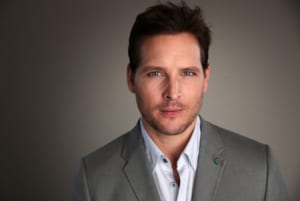 Maxwell Lord has the kind of smug, self-assured arrogance that could make even the nicest of people want to punch him. Self interest intermingles with his performed altruism and a sincere desire for scientific progress. He’s wealthy, white, and privileged and more than a bit of a douche canoe, but not quite a villain. While the first half of the season appears to set him up as the next Lex Luthor, it takes a left turn in the second half by leaving him on the side of good. His attempts to kill or maim Supergirl are never excused. Rather, he shifts his loyalty from himself to the greater good of the city when faced with the overwhelming threat that Non and Indigo pose with Myriad. He’s not quite a good guy, but he’s on the side of the angels.
Maxwell Lord has the kind of smug, self-assured arrogance that could make even the nicest of people want to punch him. Self interest intermingles with his performed altruism and a sincere desire for scientific progress. He’s wealthy, white, and privileged and more than a bit of a douche canoe, but not quite a villain. While the first half of the season appears to set him up as the next Lex Luthor, it takes a left turn in the second half by leaving him on the side of good. His attempts to kill or maim Supergirl are never excused. Rather, he shifts his loyalty from himself to the greater good of the city when faced with the overwhelming threat that Non and Indigo pose with Myriad. He’s not quite a good guy, but he’s on the side of the angels.
We have seen critics who wish Lord had turned villain, but we’re firmly in support of the narrative as written. As a voice of reasoned cost-benefit analysis and preemptive crisis aversion later on in the season, Lord adds a voice of anti-hero to the hero team. In the real world, we need the Maxwell Lords because we don’t have Supergirl to make heroic sacrifices. He might not have the purest of motives for helping people, but he helps nonetheless. And he grows. If arrogant self importance is his biggest character flaw, then admitting that his unbridled experimentation has made his worst fears a reality signals a subtle change of heart. By the end of the season, he’s even willing to trust the government with sensitive alien technology, an action that early S1 Lord would have considered impossible.
Astra’s redemption arc may have been cut off right as it began, but Maxwell Lord’s follows through, proving that Supergirl truly can influence and inspire others to do the right thing, even if he insists that he made the decision entirely on his own. Of course, we know better. Maxwell Lord is a nice addition to the heroes side, adding an alternate source of opposition and conflict that isn’t entirely evil or objectively wrong. He injects a bit of murkiness into the morality of the show, without quite pushing things over the edge of grey morality. It is very nice to have a morally ambiguous character who is not an outright misanthrope or a sociopath; he cares about things, even if most of those things are himself. Like Spike from Buffy or Vex from Lost Girl, Maxwell Lord swings between loveable and punchable depending on the episode and who you ask. But in our opinion, he will grow on you by the end of the first season. He’ll grow like a weed, but one of the nicer ones. Dandelions, maybe.
The Big Bads: Livewire
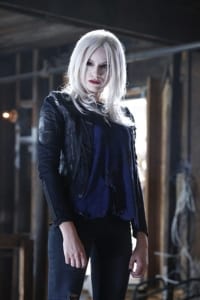 It’s no accident that Livewire’s introduction takes place in one of the first Cat heavy episodes. Her rise as a villain is part of an exploration of Cat Grant as mentor and mother. She was one of Cat’s protégée and highlights who Cat used to be before she met Supergirl. Episode 4 makes it clear that the very character traits that make her a successful shock jock radio personality are ones Cat valued and nurtured: fierce independence, quick wittedness, and a willingness to speak her own mind.
It’s no accident that Livewire’s introduction takes place in one of the first Cat heavy episodes. Her rise as a villain is part of an exploration of Cat Grant as mentor and mother. She was one of Cat’s protégée and highlights who Cat used to be before she met Supergirl. Episode 4 makes it clear that the very character traits that make her a successful shock jock radio personality are ones Cat valued and nurtured: fierce independence, quick wittedness, and a willingness to speak her own mind.
Though we see Cat value these traits in other employees in the rest of the season, she has changed since she mentored Leslie. As she says to Leslie, “People don’t want your brand of negativity anymore, Leslie. They want optimism, hope, positivity.” Cat refuses to allow Leslie to take down the superhero she helped create. She’s made it a part of her new mission at Catco to not just maintain the Supergirl brand, but foster the ideals Supergirl represents. The independence she fostered then comes back to bite her when Leslie becomes Livewire and turns on her former mentor. Livewire thus represents the Cat’s old value system at war with her new one. She’s a villain of Cat’s own making and an extreme, but pointed look at the need for balance. Valuing assertiveness and independence without compassion and community can be damaging to relationships.
Leslie also represents a kind of extreme distortion of feminism that looks out only for one’s own interests rather than using a position of power to help others, often tearing other women down in the process rather than lifting them up. While it’s definitely adorable that the strongest insult Kara could lob at Livewire is ‘you’re a Mean Girl!’ that particular choice of phrase is probably not an accident. Leslie Willis is just that; a really, really mean girl. She represents a particular type of female bully that most women have had to contend with in their life, and she also represents the unfortunate fact that some of the girls who behave that way grow up to be women who behave just as badly. Leslie also falls back on the typical bully defense of ‘I’m just being honest,’ mistaking cruelty for sincerity. Fortunately, in Supergirl’s universe, this kind of behavior is not tolerated.
Kara offers her the chance to change, like anyone else he encounters, but Leslie firmly rejects her, driven by equal servings of ego and bitterness. It’s not that Livewire’s motivations and origin story aren’t understandable, but she makes the choice to not change her antagonistic ways, thus tightly limiting the amount of sympathy she is due. In Supergirl, often the only difference between the heroes and the villains is the choice to do the right thing when faced with the option to be selfish or cruel. If there was a nice bone in Leslie Willis’ body, it was vaporized by the same lightning bolt that turned her into Livewire.
Theme: Feminism

If the overly in-your-face presentation of the feminist ideas in the pilot turned you off, bear with it; the rest of the show dials it back quite a few notches, choosing to impart its feminist ideals through showing rather than telling. We believe the lack of subtlety in the pilot wasn’t so much about the writers believing the audience needed their hands held through Feminism 101, it was more in the spirit of “okay, we’re going to directly acknowledge and clearly outline what our stance is once, and only once, so we never have to explain it again. From now on, this show exists in a universe in which being anything but a feminist is absolutely absurd, and those who break this rule will be shown as the antagonists they should be viewed as in real life.”
In Supergirl’s universe the most powerful media company is owned and operated by a woman, who has ensured that over 80% of her child companies are run, owned, and/or operated by women. The president is a woman; the female pronoun “she” is generic, and even god can be casually referred to as being female. Supergirl herself is a hero that both little girls and little boys can look up to. Cat’s son Carter is arguably the show’s most visible Supergirl fanboy. Like, he almost dies trying to meet his favorite hero.
“Can you believe it? A female hero. Nice for my daughter to have someone like that to look up to.”
Both the DEO and the US military demonstrate diverse hiring tactics, and the DEO sports truly gender-neutral uniforms. A full range of women exist in the recurring cast, all of which defy simple categorization. Every mother has a life outside of her children, every career woman has a life outside the office, and every woman has a believable range of traits and flaws, making each of them feel truly like real, living, breathing people. There are enough female characters in Supergirl that it is hard to pick a favorite. Including both heroes and villains, you’ve got an entire soccer team to pick from.
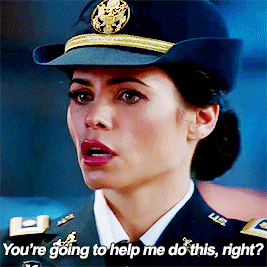 These women support each other, too. It has no time for the toxic idea that individual women matter more than the community. Every one of the powerful, intelligent, and skilled women in positions of power (Cat, Kara, Lucy, Alex) verbally express their desire to use their positions to lift up other people. The rare occasions where a character exhibits pettiness or an ‘I’m just out for myself’ attitude—Siobhan Smythe, for example—are framed negatively. At no point do Lucy and Kara turn on each other, or James, because of their romantic interest in him. Everyone involved in the romantic subplots is treated as an adult responsible for their own feelings and behaviors. Supergirl has no use for the “all women are catty” trope we see so readily on other shows.
These women support each other, too. It has no time for the toxic idea that individual women matter more than the community. Every one of the powerful, intelligent, and skilled women in positions of power (Cat, Kara, Lucy, Alex) verbally express their desire to use their positions to lift up other people. The rare occasions where a character exhibits pettiness or an ‘I’m just out for myself’ attitude—Siobhan Smythe, for example—are framed negatively. At no point do Lucy and Kara turn on each other, or James, because of their romantic interest in him. Everyone involved in the romantic subplots is treated as an adult responsible for their own feelings and behaviors. Supergirl has no use for the “all women are catty” trope we see so readily on other shows.
It isn’t just women supporting women, though that is the overwhelming atmosphere. Men support men, women support men, men support women. There is an overarching camaraderie and fellowship of support amongst the main cast of protagonists, regardless of race or gender, that speaks to feminist ideal of everyone being lifted up and treated equally.
The show doesn’t forget the other side of the feminist theory coin, either. Men express a full range of emotions, including the ones that make them cry, without a peep of ridicule: this show has no time for toxic masculinity nonsense. Any character who expresses sexist ideas, whether they be against women or men, is clearly painted as an antagonist: the show is very, very adamant about ensuring that its depiction of sexism (as well as racism and xenophobia) is not an endorsement. And it’s not subtle about it either; often times a sexist idea is slapped out of the air by the next sentence, and if not then certainly by the next scene.

Like when Leslie Willis (Livewire) mocks Supergirl’s “chastity belt of steel” only to be called out for it by Cat immediately afterward. The neutering of female bodies is just as problematic as an overly sexualized costume in this world. The conclusion: women should not be judged by anything they put on their bodies. Supergirl follows through on that ideal by giving each of the female characters her own sense of style that reflects her personality and choices. Older women like Eliza Danvers and Cat Grant have just as tasteful, flattering, and unique a wardrobe as the young women like Lucy, Kara, and Siobhan. The female villains are not overly sexualized nor are the protagonists overly modest/virginal (no Madonna/whore complex here).
The one exception to this solid presentation is when Supergirl is influenced by red kryptonite and she changes to a more form fitting wardrobe, and demonstrates a much more flirtatious and sexual vibe. However, the takeaway we took from this was less that her sexuality was being emphasized by her wardrobe choices than her comfort with her body. The scenes work terribly out of context, but work maybe 3/4ths of the way when viewing the episode as a whole. It definitely was a low mark for the series in an otherwise excellent episode, and the episode does acknowledge the problematic things that Kara did and said while under the red kryptonite influence, so consider this more of a nibbling nitpick than a hard-lined critique.
 While every protagonist behaves in a manner consistent with the spectrum of feminist ideals, Cat Grant acts as the voice of feminism in the show, and is the character through which the writers express feminist ideas directly. The show avoids being overly preachy about things or insulting to the audience’s intelligence, but it gets direct when it needs to. Cat dispenses advice to Kara (and Supergirl, intentionally or not) and even Lucy Lane in way that is instructive, but never condescending.
While every protagonist behaves in a manner consistent with the spectrum of feminist ideals, Cat Grant acts as the voice of feminism in the show, and is the character through which the writers express feminist ideas directly. The show avoids being overly preachy about things or insulting to the audience’s intelligence, but it gets direct when it needs to. Cat dispenses advice to Kara (and Supergirl, intentionally or not) and even Lucy Lane in way that is instructive, but never condescending.
Cat: “Oh, Kara. You have stumbled upon the most annoying question of the century, and you are so young that you don’t even realize it. How do you juggle it all? You learn. That’s how. You start with two balls before adding another. I figured out how to be brilliant in business and then I added being a brilliant mother. Far too many women burn out trying to do too much before they’re ready.”
Kara: “So you can have it all?”
Cat: “Of course. Just not all at once, and not right away. And not with that hair. Use conditioner, for God’s sake.”
___
“I am not immune to the allure of James Olson wearing a shirt that’s unbuttoned one too many, but a woman with brains who gives up everything for love inevitably finds herself staring into an existential abyss that men, babies, and cardio bars simply cannot fill. You are a smart and confident woman who needs to work, otherwise you will lose your confidence, your sense of identity and most importantly, your mind.” —Cat to Lucy, upon learning that she had moved without an employment plan in place
At the same time, Cat is more than a mouthpiece for feminist insight. Because of how she is written, the audience never loses sight of the fact that Cat has earned her position as a mentor by living through the realities she speaks about. She learned the hard way that women have to “work twice as hard to be seen as half as much” as males and are not allowed to display negative emotions for fear of losing their careers. As a side note, this example feels so specific that we cannot help but wonder if there is a nugget of personal experience behind it. One of the lead writers and executive producers of Supergirl is Ali Adler, and we can’t help but feel like it’s her speaking directly to the audience through Cat with monologues like this one.
“When I worked at the Daily Planet, Perry White threw a chair through a window because someone missed a deadline: and no, he did not open the window first. If I had thrown a chair…- my god- if I had thrown a napkin, it would have been professional suicide.”
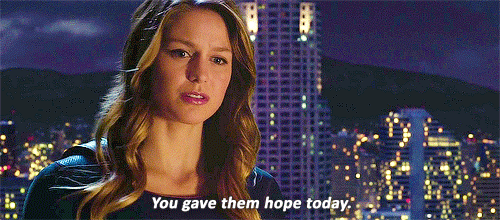 Cat’s monologues work because they flow from Cat’s character and experience. It’s a rare feat of writing to make such a compelling character who can dispense wisdom without sounding preachy, and Supergirl accomplishes it. While it is primarily Cat mentoring Kara, some of the most touching moments in the show are where Kara (or Supergirl) is mentoring Cat. Every woman deserves to have a mentor like Cat Grant; someone who inspires and pushes you to be better, but is also inspired and pushed to be better by you.
Cat’s monologues work because they flow from Cat’s character and experience. It’s a rare feat of writing to make such a compelling character who can dispense wisdom without sounding preachy, and Supergirl accomplishes it. While it is primarily Cat mentoring Kara, some of the most touching moments in the show are where Kara (or Supergirl) is mentoring Cat. Every woman deserves to have a mentor like Cat Grant; someone who inspires and pushes you to be better, but is also inspired and pushed to be better by you.
“You know the worst decisions I’ve ever made in my life were based on fear, but you showed me that there was another way to be strong, by… by having faith in people. By believing that goodness would prevail. And because of you, I started letting people in. … Now, I can’t tell you what to do, Supergirl, but if you’ve taught me anything, you have taught me that hope is stronger than fear. And that is what I think of every time I think of [that symbol on your chest.] You’ve changed me. And I am not easy to change. And I believe that you can change everyone out there. Not with violence, not with fear. Just be Supergirl. That’s all anyone’s ever needed from you.”
Spotlight On: Dialogue and Music
If you haven’t gleaned it already, Supergirl relies on dialogue to sustain it rather than shock and awe tactics or dramatically satisfying twists. We include a Best Quote for each episode for a reason, yet, frequently, one or more quotes could be listed alongside the one we chose. The series fairly explodes with relevant, poignant, or sometimes just adorable lines of dialogue. In terms of sheer quantity of words, think The West Wing more than CSI. It barely has more than a few seconds of silence, much less half a minute. Most of it is dialogue too, not one sided expositional monologuing. Direct addresses like Cat’s speech to National City in “Human for A Day” are frequently interwoven with a second direct address by another character in another scene to form a single, cohesive whole. You don’t ever feel like the show is talking at you rather than talking to you.
Part of the reason that the pacing works so well despite the large quantity of dialogue is because of the quality of the dialogue. More happens in the words than in the spaces between them, but the script does not waste time on tangents or non sequiturs. The action supports and draws from the dialogue and character development rather than the characters being shoved into the plot as needed. Even fight scenes make heavy use of dialogue and when they don’t the fights tend to be shorter and more to the point. The show also utilizes a healthy amount of foreshadowing without beating you over the head with it, which is a welcome change of pace when it comes to comic book plots. The word count on Supergirl’s script is almost as insane as our meta articles, but every bit of it is crisp, clear, tight, and necessary.
The sheer volume of conversation lends weightiness and emotional power to the silences. The sequence where Kara saves Earth in the finale has only music, but resonates all the more for its reliance upon the music to carry the dramatic tension.
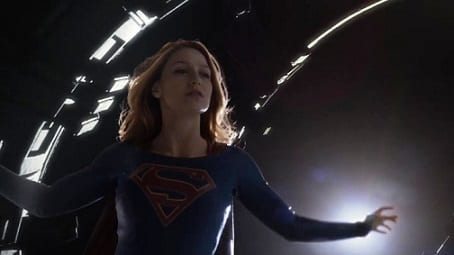
In fact, the music for the series feels more like a film score than a television soundtrack. Most of the series utilizes an original score rather than modern pop/rock songs (though there are those too, but they’re limited to family or social scenes like Alex and Kara watching TV or cheeky training montages). And the original score is on par with, if not better, than Supergirl’s big screen comrades: it is so good it took us aback in several moments, especially in a television environment where original scores are rarely memorable. Composer Blake Neely has done some really amazing things on this score, especially the overture and fight themes. His work is on iTunes if you’re inclined to check it out.
We’d like to offer some additional brownie points to Supergirl for including several female covers of popular songs, including Take Me To Church and Go Your Own Way. It’s a subtle touch, but one that adds a lot to the female-positive atmosphere of the show. All of the licensed music in the show compliments the plot and the score, rather than feeling shoe-horned in purely to rack up iTunes sales.
Extra Tidbits
- Another bit of casual feminism: Cat calls out Kara’s habit of apologizing all the time as a problem.
- The only continuity error we’ve noticed so far is in Episode 6, where Red Tornado gets his arm broken off by Kara’s freeze breath, but the next scene has the arm fully formed again. Given how many continuity errors and nitpicks we had about The 100 (which had a shorter season than Supergirl btw), this is impressive.
- Lucy’s cattiness is handled pretty well. She’s clearly projecting her own insecurity on Kara/Supergirl. The narrative neither endorses nor condemns her reaction either, which goes a long way in normalizing such an understandable emotional situation.
- Likewise, James’ hesitation over Lucy taking the job at Catco is framed as a result of his own personal job dissatisfaction rather than about the love triangle with Kara or his desire to put his own career first. Seeing Lucy so excited about the opportunity forces him to face the reality that he’s not happy with his job and misses being an investigative journalist. As with Lucy’s jealousy, it is a very adult take on what could have devolved into high school level pettiness and love-triangle bullshit.
- The directing, cinematography, and sound mixing for the fight between Alex/Dr. Morrow and Kara/Red Tornado is excellent. It’s also the first time we’ve seen Alex and Kara use deadly force against a human villain. Bonus points: neither of them waste several episodes afterwards in a groan-worthy shame spiral like some other costumed heroes we could think of.
- Superman is a GIANT NERD. He names his powers and even has a name for when his powers are drained, a “Solar Flare.”
- We both want an ice bucket full of M&Ms for when life gets stressful. What an excellent diversion away from alcohol.
- Episode 8 calls out the double standard regarding what powerful females are attacked for in the media versus what powerful males are attacked for (for example: Cat’s real age, expensive haircuts, personal shoppers, being turned down for a date).
- First time we’ve seen major destruction of property in a villain fight that is due primarily to Kara’s actions is when she fights Astra in Episode 8.
-

Dirk Armstrong, aka the “walking personification of white male privilege” “Walking personification of white male privilege” is one of the best insults ever.
- Not all Kryptonians are white! Yay!
- The alien who splits himself in two (Episode 9), is super cool. We want to know his story.
- Kara snorts when she’s nervous. (Does Melissa Benoist do it too?)
- “The media doesn’t exist to make people like you feel comfortable, Max. Our job is to report the truth.”—James Olsen, my friends. He’s a treasure.
- Clark Kent is super supportive of Kara as a hero and as a person and that warms our hearts.
- As a jew, it makes me very happy that the tradition of drawing inspiration from Jewish text, faith and heroes in Superman mythos is kept alive in Supergirl. Both Jerry Siegel and Joe Schuster are given writing credits in every single episode. I am sure they would be honored and proud that Supergirl strives to achieve the essence and heritage of their greatest creation. – Elizabeth
- J’onn saying that Lord’s “narcissism and ill-kempt facial hair” ruined his not-date with Alex gives us life.
Two more weeks until we’re done and Season 2 starts. Get Hype. Until then, see you next week. Same time, same place. Same two nerds fangirling about Supergirl.


